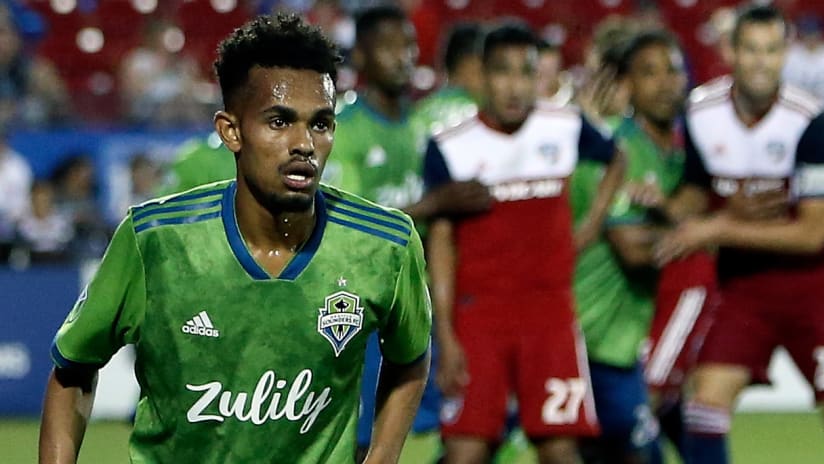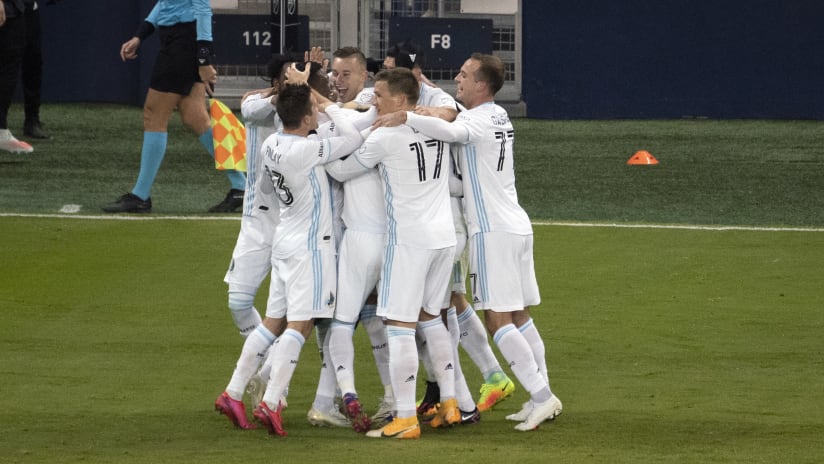Confession: I hate starting this column with anything remotely resembling the phrase “win-win” with regards to the Seattle Sounders trading Handwalla Bwana to Nashville SC in exchange for Jimmy Medranda and a package of allocation money that could run up to a quarter-million dollars.
That’s what this deal is, though.
Bwana, 21, took a long look at the Sounders’ depth chart, specifically the wing spot locked down by MLS MVP candidate Jordan Morris, and didn’t see the pathway to regular minutes that he wants and needs at this point in his career — and he was approaching the final year of his original Homegrown contract. So he requested a trade, firmly.
The Sounders explored the market and found a willing taker, specifically an organized expansion club with allocation bucks to spend and an alluring player of their own as a makeweight. Medranda’s injury woes have dropped him off the radar lately but he was a highly versatile and dynamic utility man in Kansas City. Bwana also seems to have gotten a new contract in the process, and Seattle will try to mobilize their industry-leading performance department to solve Medranda’s fitness issues and kick-start his career.
Everything fell together nicely. But that’s hardly the only noteworthy observation here.
You’ve probably heard of #FirstWorldProblems, a handy online shorthand for challenges which are enviable to face, but challenges nonetheless. And here we seem to have an MLS youth development parallel – call it #PlayYourKidsProblems, perhaps.
The Sounders are one of the league’s most successful clubs because they do a little bit of everything, and they do it well. They’ve set up a 2 team in USL, invested in their academy, scouted savvily and reaped promising young prospects from that. They spend heartily and ambitiously on the international transfer market. They do free-agent signings and smart intra-league deals like this one. They have shown themselves eminently capable of competing for trophies in the present without neglecting or mortgaging their future.
Bwana’s story is an inspiring and triumphant one within that wider narrative. A Somalian exile whose difficult childhood took him from a Kenyan refugee camp to Atlanta and eventually to Seattle, he overcame the odds to become a college star at the University of Washington and finally a Cinderella Sounders homegrown, bursting with expressiveness both on and off the pitch.
It would be picture-perfect if he could continue that ascent in Rave Green, and perhaps eventually be the one to spearhead another MLS Cup hoist. Their fans would eat it up, and so would boosters of the league’s academy movement. But Bwana’s not in Brian Schmetzer’s regular rotation right now, and after nearly three years of immersion in Seattle’s culture of competition and achievement, he’s not content to continue waiting for his turn.
“We would have preferred to keep Handwalla here,” Schmetzer told media after Sunday’s scoreless draw with the San Jose Earthquakes. “He’s got some talent. He was a homegrown player. We certainly have a strong commitment to our homegrown process. But if a player doesn’t want to be here, sometimes you just have to make decisions that are best for both club and the player. … He felt like there was a logjam with Jordan playing in his position. That’s a decision we made.”
It’s no longer enough to identify and nurture young talents, nor to sign them to first-team contracts. Players of the caliber required to continue advancing the overall undertaking are no longer as content with those basics as their predecessors of just a few years ago. This is not a criticism of the Sounders — who have done right by Bwana with this outcome — so much as a simple reminder that their ambitious approach can serve up consequences like these.
In Nashville they found a club eager to keep building out their own fledgling club culture with that very type of byproduct. Bwana becomes NSC’s third Homegrown import alongside Derrick Jones (Philadelphia) and Alex Muyl (New York Red Bulls). When you add in other “project” types like Abu Danladi and Dave Romney who needed a little bit of extra molding to make the most of their abilities at professional level, then consider their host of USL and SuperDraft prospects, a pattern becomes clear.
By design, a plentiful harvest requires a wider distribution. Seattle, and others, will inevitably develop more useful players than they can put to use at any given moment. Netting a solid return on them is the next phase of the Play Your Kids project.








